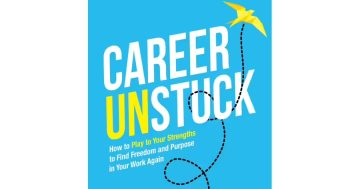Andrew Taggart* explains why careers are a bad and destructive idea — not just for the person who embarks on one, but for everyone.

Image: 3D_generator
When children are quite young, they’re asked repeatedly by their parents, schoolteachers, and other adults what they want to be when they grow up.
To the best of my knowledge, rarely does an inquiring adult expect to hear: “A loving human being open to whatever life brings me.”
The question of what “to be,” or rather, what occupation to choose, soon becomes one of children’s fixed ideas, something that takes centre-stage in their ideas for the future.
Schools have come to function as a way to produce knowledge workers.
Later, universities will forcefully push this agenda by employing career counsellors, setting up career resource centres and tracking career placement.
Throughout their formative years, therefore, young people are hammered with the idea that they need to have a career — and not just any career, but a “worthwhile” or “fulfilling” one.
This narrative has become so deeply rooted in common sense that it has become hard to even see it, let alone to question it.
What is a career?
Former Facebook President Sean Parker once remarked, “I think a career is something your father brings home in a briefcase every night, looking kind of tired.”
I think it’s worse than that.
Careers are a bad and destructive idea — not just for the person who embarks on one, but for everyone.
A job is a way of packaging, by means of an employer–employee contract, some reasonable contribution the employee may want to make to the world together with a livelihood (a steady paycheque) and a suite of benefits.
But a career is a work-centric story of progress about an individual’s life course, a story that confers a sense of purpose and unity upon specific work experiences as well as a staid identity (journalist, firefighter, accountant, etc.) upon an individual.
The aim of the career is work success.
Whether it’s Career 1.0 (which promises career advancement via promotions and the receipt of more senior titles) or Career 2.0 (which requires a customised portfolio that can demonstrate one’s advancement through a precarious work world) doesn’t matter.
Both presume the centrality of a story I tell myself not just about the work I do, but above all, about who I am.
Why the career is a pretty bad thing
To begin with, a career rests upon justifications for actions (or inactions), which are narrowly focused on personal self-interest.
It’s not that performing a surgery is necessarily a bad thing.
But if the doctor performs the surgery expressly because they are trying to advance their career, they may be performing an unnecessary surgery and the patient may needlessly be put at risk.
And this is not an isolated case, since being committed to careerism readily commits one also to giving justifications for one’s actions (or inactions) that are not primarily focused on whatever the right thing to do is, but rather on the best ways of getting ahead.
At the very least, these justificatory patterns cause us to be embroiled in conflicts created by careerism itself: do I do the right thing because it is the right thing, and thereby risk sacrificing my own ambitions?
Or do I promote my ambitions at the possible or actual expense of others?
This kind of conflict may not be present in each case, but it’s built into the structure of careerism.
On top of self-interested justifications is an even greater illusion.
The kind of work-centrism underwritten by the career teaches each of us to identify with the work we do and, as a result, to become deeply attached to that identity.
Consequently, many people feel anxious when that identity is threatened, proud when it’s affirmed, and utterly lost when it’s gone.
In our work society, for instance, the aged often have no place or role to play after they can’t work any longer.
A woman who needed to retire from her professorship due to lupus wrote to me recently to say that the amplified focus on work in our culture “marginalises the old and the sick, and robs the young of an imaginative childhood”.
She concludes: “There are no cultural models in our world for leisure with dignity.”
And this is so because there are no reigning cultural models urging us to disidentify from whatever we do so that we might carry out the work we do for however long we do it with proper care, but without getting hung up on being it.
By perpetuating this strong identification, the career ends up causing all kinds of people to suffer.
Leading on from the breeding of self-interestedness and the nudge toward strong identification is the most damning objection to the career.
It is that the career obfuscates the vital existential anxiety we would otherwise feel by coercing us to mistake whatever modicum of fulfillment we find through the work stories for a sense of ultimate fulfillment.
But no work we do, however fulfilling, can provide us with a sense of ultimate fulfillment.
A bad but sticky idea
For too long, the career has been a bad but sticky idea.
It has clung to social life, sometimes changing shape, almost always vainly worrying about its wan appearance.
But its time has come.
We should stop asking our children what they want to be when they grow up.
It’s a pernicious question.
And we should want to live in a world where the pin-you-down question, “What do you do?” is seen as so terribly vulgar that it’s not worthy of serious consideration.
We should kill that question as well.
Instead, we should ask our children how, in a fundamental sense, they wish to live; what and for whom they wish to care; what they shall ultimately seek; for what, or for whom, they’d be willing to die; in what ways they can be open to what life brings them; and how they can, as they are dying, be so sated with life that they close their eyes free of regrets and resentments and at peace with all that is.
To kill the career is to begin to wake up to life.
* Andrew Taggart is a practical philosopher. His website is www.andrewjtaggart.com.
This article first appeared at qz.com.











